If you want to learn a language, the way to start is by building up a mental “dictionary” of basic words – this is true if
you want to learn English.
While it may sound boring at first, building up a basic English dictionary in your head is the first step to learning enough English to have a conversation.
If you don’t know enough simple English words for daily use, you won’t be able to ask questions and understand the answers.
You also will not be able to convey thoughts or emotions.
Tips For Learning Basic English Words
A quick Google search should provide you with lists of daily use English words with meaning.
Looking through and memorizing these 20 to 100
English words for beginners will help you learn enough to build up your vocabulary enough to have a conversation.
Try reciting the words aloud over and over for yourself.
One of the most efficient ways to learn English words for beginners, however, has got to be to look at lists of basic English words with pictures.
Try and find picture books or other materials for learning basic English words for kids.
Being able to see a picture of what
a basic English word is supposed to means is a great way to imprint it into your memory.
90 Basic English Words That Every English Learner Should Know
Here is our own list of some basic words you should get to know.
There’s also a downloadable PDF file with all these words waiting for you in the end. Let’s dive in!
1. Hello
This is a basic greeting.
2. Goodbye
This is what you say when you are leaving.
3. Yes
This is a word that you say when you agree with something someone has said.
4. No
This is a word that means you disagree with something someone has said.
5. Please
This is a polite way to call someone’s attention. When you are asking someone for a favor you should say “please.”
6. Thank you
When someone does something for you, this is the polite response.
7. Help
If you need someone to do something for you because you can’t do it yourself, you ask for help. If you are in trouble, you should yell “Help!”
8. Sorry
This is what you say if you’ve done something wrong to someone. You can also use it to ask for their attention or interrupt them.
9. Person and People
This is a word that is used when you are talking about humans. A “person” is the singular form, what you use when referring to an individual. “People” is what you call a group.
10. Man and Men
A man is a person who is male. Meanwhile, a group of people who are male are men.
11. Woman and Women
A woman is a person who is female. A group of people who are female are women.
12. He or Him
These are used to refer to a male person. The words “person” or “man” are nouns. “He” and “Him” are pronouns which is a shorter word that is use in place of a noun.
13. She or Her
These are pronouns that are used to refer to a female person. You can use these in place of “woman”.
14. They or Them
These are gender neutral pronouns that you can use to refer to people.
15. I
This is a pronoun you can use to refer to yourself.
16. Me
This is a word you can use to refer to yourself.
17. Mine
This is a word that indicates possession. If you say something in “mine” you are saying it belongs to you.
18. You
This is a gender neutral pronoun that you can use to refer to another person. This is usually what you use when talking directly to someone.
19. We
This is a pronoun that you can use to refer to yourself and other people as a group or collective.
20. Child and Children
These are gender neutral terms that mean a young human or person. A “child” is one young human, while “children” refers to a group of young humans. If someone is below the age of puberty or not yet of legal age, they are usually considered a child.
21. Teenager
If a young human is above the age of puberty, they are referred to as a teenager.
22. Boy
A child or teenager who is male can be called a boy.
23. Girl
A child or teenager who is female can be called a girl.
24. Parent
A parent is someone who takes care of a child. Often this is a blood relation of the child.
25. Father
A father is the male parent
26. Mother
A mother is the female parent.
27. Son
Male offspring.
28. Daughter
Female offspring.
29. Brother
Someone who has the same parent as someone else. If there is more than one male offspring, they will refer to each other as “brother”.
30. Sister
Someone who has the same parent as someone else. If there is more than one female offspring, they will refer to each other as “sister”
31. Thing
An object that is not alive.
32. Animal
A living being that is not human.
33. Plant
A living thing that grows on the earth.
34. This and That
These are pronouns used to refer to things. They can also be used to refer to living things that are not human.
36. These and Those
These are other pronouns used to refer to things. They can also be used to refer to living things that are not human.
37. It
Another pronoun that can be used to refer to things or living things that is not human.
38. Time
This is a concept which means a measurable period when an action happens.
39. Hour
This is a specific unit of time.
40. Day
Can either mean 24 hours of time or the time when the sun is in the sky.
41. Night
The period of time when the sun in not in the sky.
42. When
This is an interrogative word, which is a word that asks a question. When you ask “when” you are looking to know a specific unit of time.
43. Who
This is an interrogative pronoun. The answer to the question “who” refers to a specific person.
44. What
This is an interrogative pronoun. When you ask “what” you are asking about a particular thing.
45. Why
This is an interrogative pronoun. When you ask “why” you are questioning the reason behind a certain action.
46. Place
This means a venue or address where you are, where another person or object is, or where an action or event is taking place.
47. Where
This is an interrogative pronoun. Where you ask “Where” you are asking about a specific place. Often the answer is a specific place at a specific time and date.
48. Here
This refers to the present location. When you are “here”, it refers to where you are at present.
49. Now
This is a word that means the present time. When you say you are somewhere “now”, it is your present location.
50. Later
This word refers to a future time. When you say you will be somewhere “later”, it refers to your location in the near future.
51. From
When you say something is “from” somewhere, you are talking about where it was before it came to its present location.
52. Building
This is a man-made structure, usually consisting of walls, a floor, and a roof.
53. Home
This is a building that is used as by people or a group of people as a residence. Where they eat and sleep on a daily basis.
54. Store
This is a building where good and services are available for sale.
55. Restaurant
This is a building where meals are available for sale. The meals can be eaten there.
56. Eat
This is the act of taking in food or having a meal.
57. Drink
This is the act of taking in liquids.
58. Breakfast
This is a meal that is taken in the morning. Breakfast is usually the first meal of the day.
59. Lunch
This is the meal that is usually taken around mid-day.
60. Dinner
This is a meal that is taken in the evening. It is usually the last meal of the day.
61. Before
This is a word that refers to the past.
62. After
This is a word that refers to a period of time that occurs after an event.
63. To
This is a word that refers to movement. When you go “to” something you are moving closer to it.
64. School
This is a building where education takes place. People gather at a school to either teach of learn lessons.
65. Student
This refers to someone who goes to school to learn. Gender neutral and can be used to refer to an adult, a child, or a teenager.
66. Teacher
This is someone who goes to school to teach students. Gender neutral and usually meant to refer to an adult.
67. Have
This is a verb, which is an action word. “Have” means something you hold.
68. Go
This is another verb. When you or someone “go” you are moving towards something.
69. Do
This is a verb. When you “do” something, you are performing an action.
70. Get
This is a verb. When you or someone else “get” something, you move towards it and hold it.
71. See
This is a verb that refers to vision. If you lay eyes on something, you see it.
72. Smell
This is a verb that refers to odor. When you smell something, you are using your nose.
73. Sound
This is a verb that refers to hearing. You hear a sound.
74. Taste
When you taste something, you know its flavor.
75. Touch
When you touch something, you feel it. Usually with your hands, but if almost anything touches your skin, you will feel its “touch”.
76. Know
When you “know” something, you understand it.
77. Make
This is a verb that refers to creation. When you “make” something, you create it.
78. Come
This is a verb that refers to a future action. When you say you will “come” you are saying that you will be at a venue at a specific time, usually this is sometime in the near future.
79. Use
When you perform an action with something, you use it.
80. With
When you are with someone or something, they or it are with you physically. You are in the same place at the same time.
81. Want
When you want something you desire to have it.
82. For
When you say something if for someone, you are indicating that they possess it.
83. Buy
When you buy something, you give someone else money in order to posses it.
84. Sell
This refers to someone being willing to take money in exchange for an object they posses.
85. Hurt
This refers to feeling bad or being in pain due to an accident.
86. Sick
This refers to feeling bad and maybe being in pain due to illness
87. Doctor
This is someone you should see if you are feeling ill.
89. Hospital
This is a building where you will find a doctor and where you will be taken if you are hurt in an accident.
90. Police
This is a government mandated entity who is supposed to keep peace and security. If you need help you can ask for the police.
Conclusion
While it is possible to
expand your vocabulary by memorizing lists like this, you will still need to know how to use them properly in a conversation. To do so, you need to practice putting the words together and saying them to a native speakers.
This is where and why you need to find a good native English speaking tutor.
Download the PDF file with 90 basic English words below:
90_Basic_English_Words_PDF_List
Studocu выступает на стороне Украины. Мы в ужасе от действий российского правительства. Мы также знаем, что российские власти систематически уничтожают свободу СМИ, мысли и слова в России и прямо сейчас блокируют последние крупицы независимых СМИ.
Чтобы оставаться на связи, прочитайте этот гид про то, что делать в случае отключения интернета. Установите себе VPN, здесь список проверенных вариантов. В качестве независимого русскоязычного новостного портала советуем «Медузу». Сайт уже заблокировали, так что изучите в этом гугл-доке, как получить к ней доступ. Чтобы следить за ходом войны в англоязычных СМИ, читайте Associated Press и Reuters.
Vocabulary Words of English With Pictures Pdf!
There is a list of 500+ Vocabulary Words of English With Pictures of each. Vocabulary words of English are of Bathroom Vocabulary and Kitchen Vocabulary, Sports Vocabulary and exercise Vocabulary, Animal Vocabulary, and fruits Vocabulary, vegetable Vocabulary, hats Vocabulary, professions Vocabulary, and Accessories Vocabulary, dry fruits Vocabulary, weather Vocabulary, transportation Vocabulary, and garden Vocabulary, etc.
We have tried to cover every field of vocabulary by using pictures vocabulary. Vocabulary words in English are the most commonly used vocabulary words in the English language.
Here are the different sections of the Vocabulary Words of English.
Animal Vocabulary:
Video Lesson
- Panda
- Koala
- Gorilla
- Monkey
- Shark
- Lion
- Bull/ox
- Starfish
- Eagle
- Antelope
- Wolf
- Tiger
- Walrus
- Jellyfish
- Zebra
- Octopus
- Alligator
- Camel
- Owl
- Giraffe
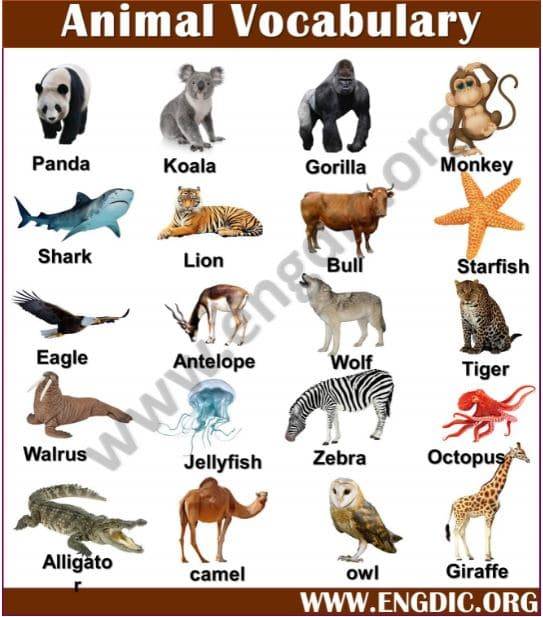
Classroom Vocabulary:
Video Lesson
- Pencil
- Bag
- Chair
- Teacher
- Desk
- Books
- Board
- Paper
- Eraser
- Stapler
- Scissor
- Glue
- Paper pin
- Notebook
- Crayon
- Sharpener
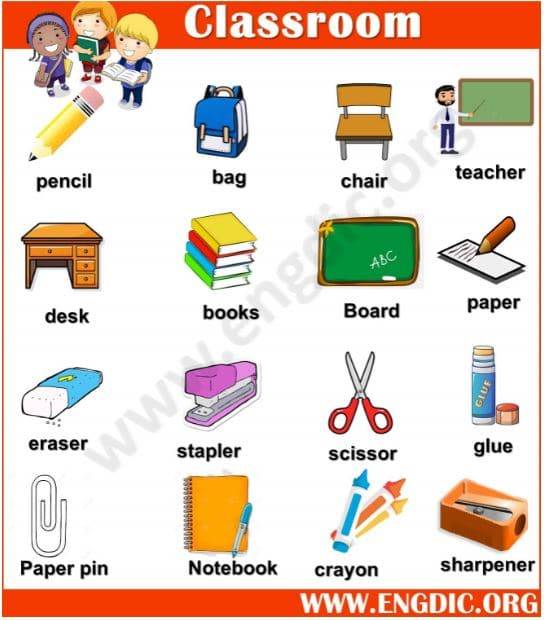
Bathroom Vocabulary:
- Towel
- Faucet
- Tissue
- Toothpaste
- Shaving machine
- Shower
- Brush
- Razor
- Bathtub
- Comb
- Toilet
- Liquid soap
- Mirror
- Soap
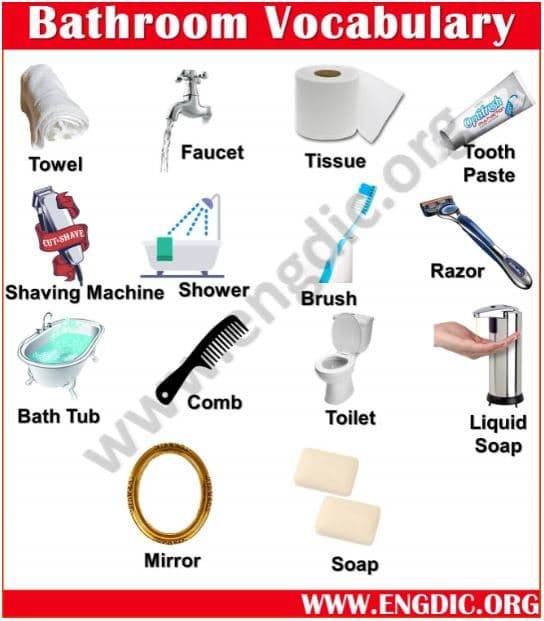
Kitchen Vocabulary:
- Scoop
- Bottle opener
- Can opener
- Oven
- Dish dryer
- Colander
- Blender
- Kitchen tools
- Spatula
- Kettle
- Grater
- Pot
- Pan
- Slotted spatula
- Rolling pin
- Dishwasher

Fruits Vocabulary:
Video Lesson
- Mango
- Strawberry
- Plum
- Avocado
- Orange
- Apple
- Grapes
- Peach
- Banana
- Watermelon
- Cherry
- Starfruit
- Pomegranate
- Kiwi
- Orange
- Apricot
- Papaya
- Lime
- Blueberries
- Pear
- Coconut
- Fig
- Raspberry
- Pineapple
- Guava
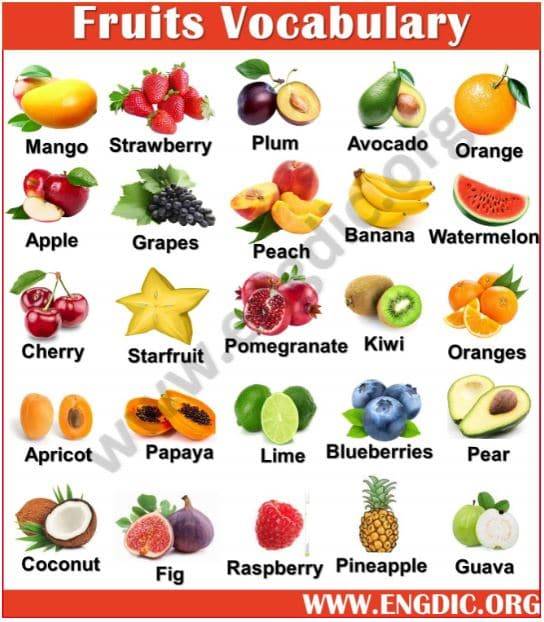
Vegetable Vocabulary:
- Brussels sprouts
- Sweet potato
- Artichoke
- Beetroot
- Carrot
- Pumpkin
- Tomato
- Potato
- Asparagus
- Pepper
- Mushroom
- Zucchini
- Peas
- Eggplant
- Lettuce
- Asparagus
- Radish
- Broccoli
- Celery
- Corn
- Cauliflower
- Cucumber
- Cabbage
- onion
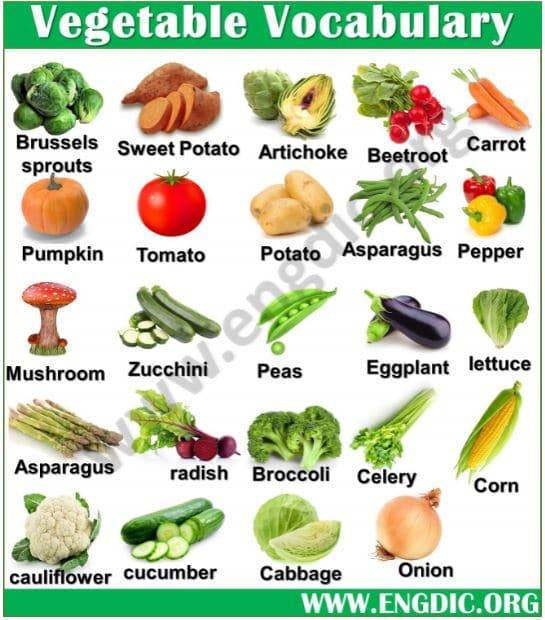
Accessories Vocabulary:
- Scarf
- Earmuffs
- Hairclip
- Watch
- Gloves
- Umbrella
- purse
- Stocking
- Bow
- Common pin
- Apron
- Necklace
- Tie
- Shoes
- Ring
- Sunglasses
- Pocket watch
- Gloves
- Socks
- Hairband
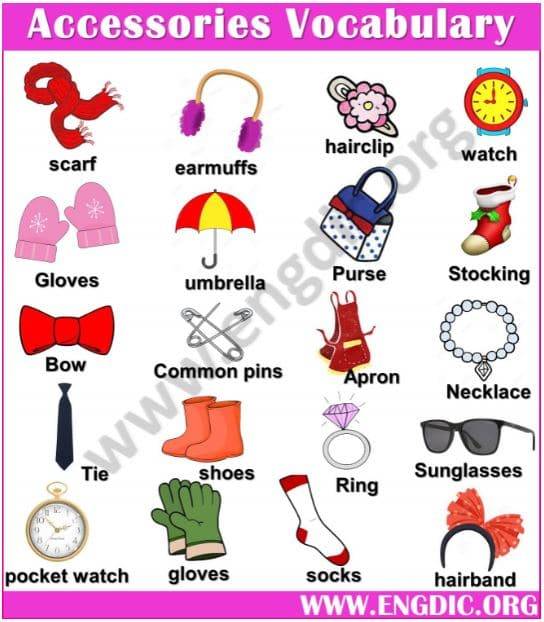
Hats Vocabulary:
- Beanie
- Derby hat
- Beret
- Cap
- Mortarboard
- Top hat
- Straw hat

Professions Vocabulary:
Video Lesson
- Entrepreneur
- Bellboy
- Cashier
- Artist
- Lawyer
- Driver
- Barber
- Chief
- Plumber
- Astronaut
- Dancer
- Tour guide
- Programmer
- Judge
- Pharmacist
- Butcher
- Speaker
- Teacher
- Estate agent
- Receptionist
- Miner
- Politician
- Vender
- Deliveryman
- Veterinarian
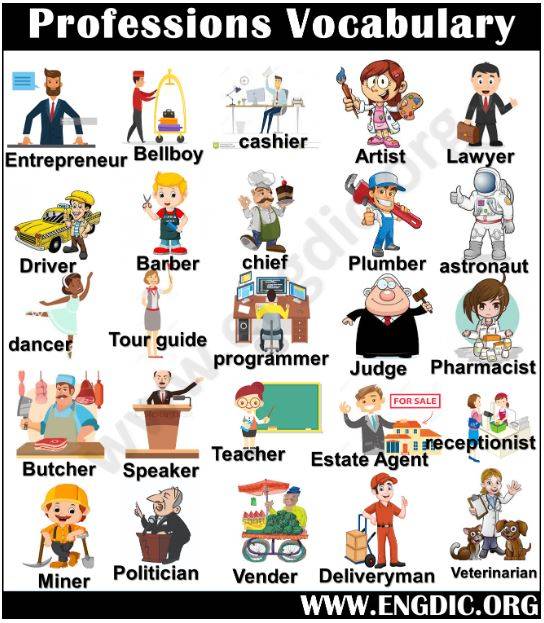
Sports & exercise Vocabulary:
- Throw
- Jiggle
- Hop
- Skip
- Ride
- Sit
- Laydown
- Face
- Kneel
- Kick
- Bounce
- Bent
- Jump
- Walk
- Shoot
- Run
- Coach
- Pass
- Hit
- Catch
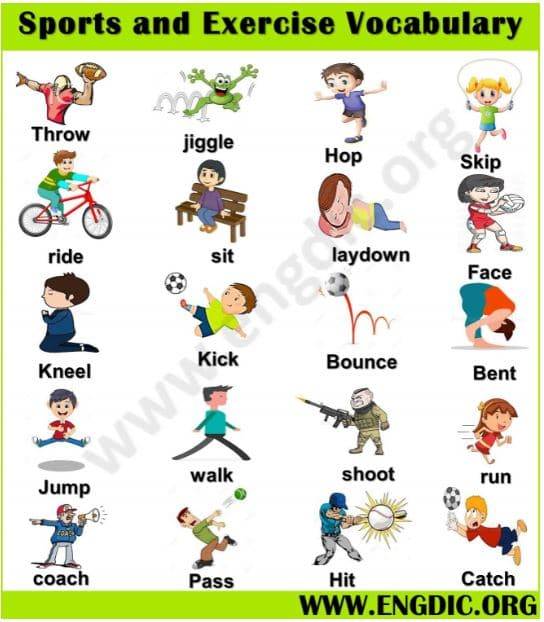
Sports and Equipment Vocabulary:
- Helmet
- Racket
- Driving fin
- Raft and oars
- Kneepads
- Goal
- Paddle
- Court
- Rugby ball
- Surfboard
- Carom
- Rollerblade
- Swimsuit
- Skies and poles
- Net
- Golf
- Basket
- Running track
- Towel
- Weight
- Fishing tackle
- Baseball

Must Learn: Daily Used Vocabulary Words with Meaning
Medical Vocabulary:
- Wheelchair
- Pills
- Scalpel
- Medical chair
- Thermometer
- Otoscope
- Tweezers
- Microscope
- Can
- X-ray
- Gauze
- Torch
- First aid box
- Ambulance
- Weighing scale
- Mask
- Turning fork
- Magnifier
- Scissor
- Saline bag
- Ointment
- Bandag
- Crutches
- Stethoscope
- Stretcher
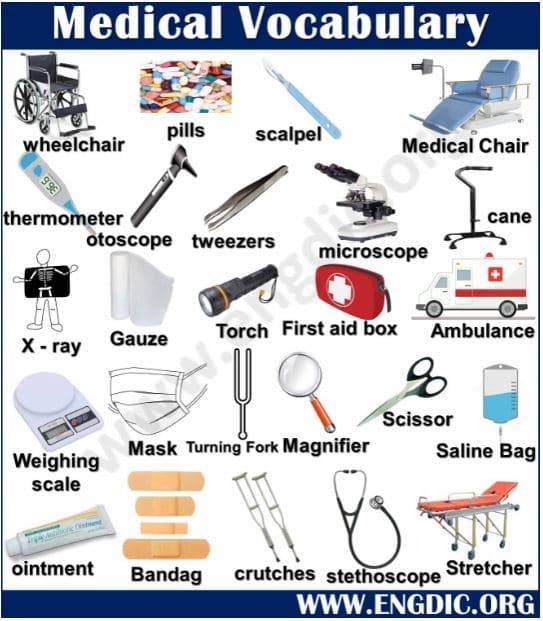
Garden Vocabulary:
- Pruning saw
- Wheelbarrow
- Watering can
- Spade
- Bag
- Seeds
- Fence
- Fertilizer
- Trowel
- Gloves
- Tap
- Hedge shear
- Flower bed
- Bucket
- Rake
- Fork
- Bin
- Hose
- Grass sickle
- Lawn mover
- Shovel
- Hoe
- Gardener
- Pruner
- Ax
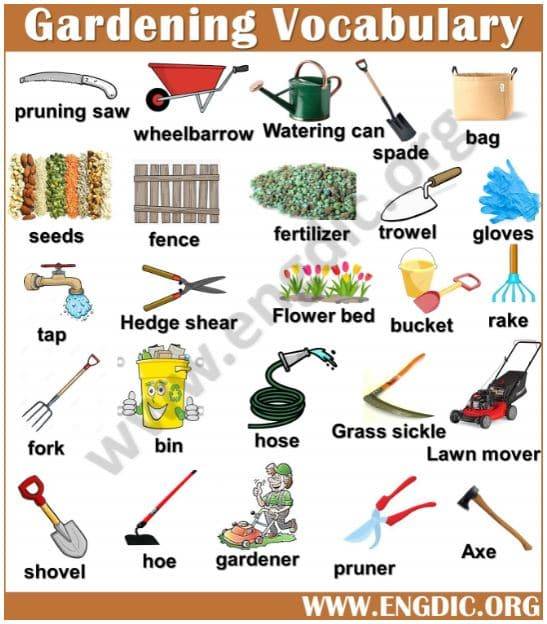
Must Learn: Men’s Wear Vocabulary
Transportation Vocabulary:
- Aerial tramway
- Dump truck
- Helicopter
- Car
- Cement mixture
- Forklift
- Carriage
- Boat
- Bike
- Airplane
- Fire engine
- Train
- Scooter
- Bicycle
- Metro train
- Crane
- School bus
- Van
- Ambulance
- Balloon
- tractor
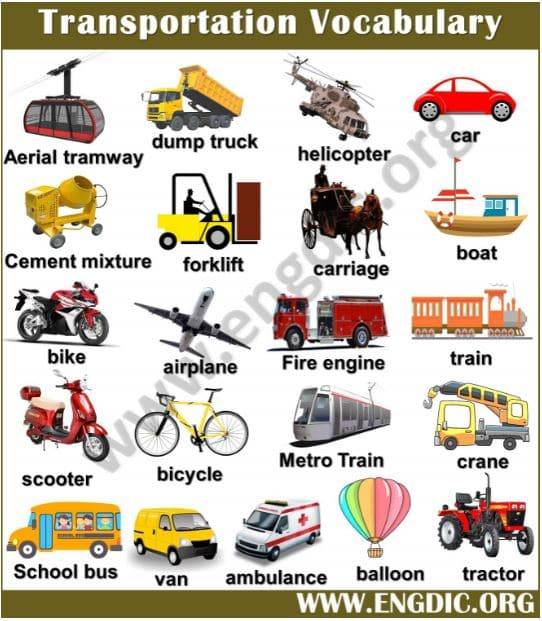
Weather Vocabulary:
- Hurricane
- Thunder
- Sunny
- Tornado
- Snowy
- Drought
- Clear sky
- Rainy
- Partly cloudy
- Fog
- Sleeting
- Cold
- Hot
- Windy
- Rainbow
- Landslide
- Volcano
- Earthquake
- Flood
- Cloudy

Must Learn: Vocabulary Words for Kids of Grade 1
Dry Fruit Vocabulary:
- Peanut
- Lotus seeds
- Dates
- Apricot
- Brazil nut
- Cashews
- Raisins
- Black currants
- Pistachio
- Walnuts
- Soy nuts
- Fig
- Coconut
- Macadamia
- Sunflower seeds

Color vocabulary:
- Black
- White
- Blue
- Off-white
- Magenta
- Tan
- Yellow
- Pink
- Purple
- Orange
- Grey
- Lavender
- Sky blue
- Brown
- Green
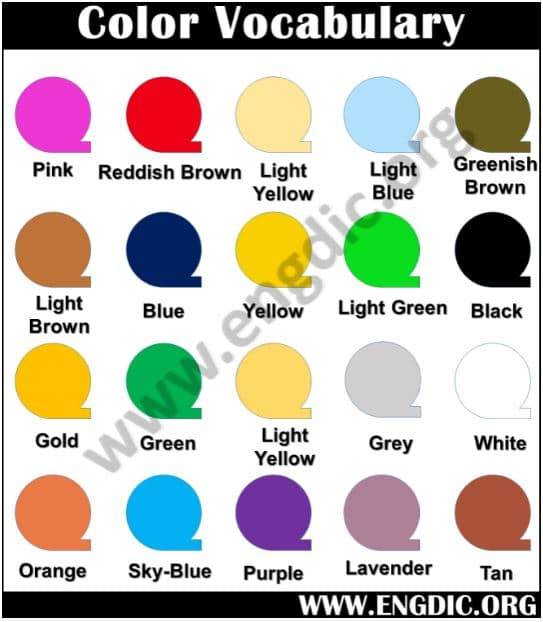
Must Download this useful lesson of Vocabulary Words of English with Pictures PDF (Download Here)
